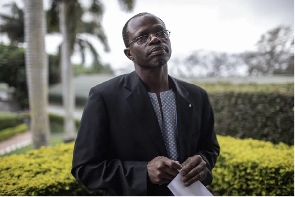Gunmen in Eswatini killed a prominent opposition politician and human rights lawyer at his home, hours after the country’s absolute monarch challenged activists opposed to his rule.
Thulani Maseko was shot dead on Saturday night by unknown attackers in Luhleko, about 50km (30 miles) from the capital Mbabane, opposition spokesman Sikelela Dlamini told AFP.
The spokesman said he was told that “assassins shot him through the window while he was inside [the] house with his family”.
“Details are still scant (and), owing to the trauma his family members are undergoing, they are not yet ready to speak,” Dlamini added.
The government sent condolences to the family, saying Maseko’s death was a “loss for the nation” and that police were searching for the killers.
Maseko was a leading human rights lawyer and columnist in Eswatini who had a pending court battle with King Mswati III over the monarch’s decision to rename the country Eswatini by decree.
The country’s name was changed from Swaziland to Eswatini to mark the 50th anniversary of its independence from Britain in 2018.
Maseko’s position was that the king had not followed the constitution in the process. In 2014, he and the editor of The Nation magazine, Bheki Makhubu, were jailed for contempt of court over articles critical of the government and judiciary.
Maseko was the founder of the MultiStakeholder Forum (MSF), a coalition of opposition parties, associations and churches.
His death came just hours after the king challenged activists fighting to end Africa’s last absolute monarchy.
“People should not shed tears and complain about mercenaries killing them,” King Mswati had said.
“These people started the violence first but when the state institutes a crackdown on them for their actions, they make a lot of noise blaming King Mswati for bringing in mercenaries,” he said.
Last week, the Swaziland Solidarity Network (SSN) alleged that the king had mercenaries, mainly white Afrikaners from neighbouring South Africa, to help Eswatini’s security forces suppress rising opposition to his regime.
But government spokesman Alpheous Nxumalo said: “No hitmen have been hired.”
Rights group Freedom Under Law, which operates across southern Africa, pointed a finger at the government.
“Somehow the stunning news that Thulani Maseko has been gunned down in cold blood comes as no surprise,” it said in a statement.
“A ceaseless and fearless human-rights lawyer, an outspoken critic of the regime in his beloved Eswatini, Thulani had all too long suffered at the hands of a heedless regime. No one can be misled by the cynical message of condolence put out on behalf of the government,” it added.
The European Union called for the killers to be caught and voiced “grave concern” about the situation in Eswatini.
Condolences Statement on the passing of Human Rights Lawyer Thulani R. Maseko. pic.twitter.com/pBKimhIwST
— U.S. Embassy Eswatini (@USEmbEswatini) January 22, 2023
“The EU calls on the authorities to ensure the safety of all citizens, including political activists,” it said in a statement.
“This tragic loss comes in a row of killings, arson attacks and other violent acts, which have destabilised the country over the past months.”
The bloc urged the authorities to urgently launch “inclusive dialogue… towards national reconciliation, respect for human rights and the rule of law, and ultimately, lasting peace”.
The US embassy in Mbabane expressed “profound sadness” and extended “deepest condolences to Mr. Maseko’s family, friends and admirers around the world”.
“Eswatini and the world have lost a powerful voice for non-violence and human rights,” the embassy added.
King Mswati, who has ruled since 1986, is regularly accused of human rights violations. The king, who can dissolve parliament, and government and appoint or dismiss judges, also commands the police and army.
In June 2021, pro-democracy protests descended into violence, resulting in several deaths.
In April 2022, members of the Economic Freedom Fighters (EFF), South Africa’s third-largest political party, organised peaceful protests along the country’s borders with Eswatini, in solidarity with human rights activists there.

















